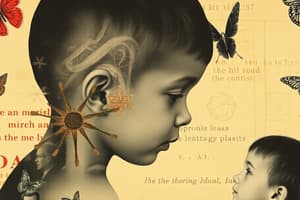Podcast
Questions and Answers
What is the primary focus of developmental psychology?
What is the primary focus of developmental psychology?
- The genetic basis of behavioral traits
- The study of abilities' development throughout childhood (correct)
- Comparing different cultural parenting styles
- Analyzing adult cognitive functions exclusively
What term describes the substances that can cause atypical development if a child is exposed to them in utero?
What term describes the substances that can cause atypical development if a child is exposed to them in utero?
- Neurotoxins
- Neurotransmitters
- Endocrine disruptors
- Teratogens (correct)
At what age does synaptogenesis begin to decline if synapses are not actively used?
At what age does synaptogenesis begin to decline if synapses are not actively used?
- After 2 years (correct)
- By age 6
- Around 1 year
- At birth
What is the percentage of an adult brain size that an infant's brain reaches by 6 months old?
What is the percentage of an adult brain size that an infant's brain reaches by 6 months old?
Which of the following is a potential consequence of fetal alcohol spectrum disorders (FASD)?
Which of the following is a potential consequence of fetal alcohol spectrum disorders (FASD)?
Which debate in developmental psychology examines whether development occurs in stages or gradually?
Which debate in developmental psychology examines whether development occurs in stages or gradually?
What occurs in the brain around the age of 2 regarding synapses?
What occurs in the brain around the age of 2 regarding synapses?
What is one of the effects of exposure to air pollution during pregnancy, according to studies?
What is one of the effects of exposure to air pollution during pregnancy, according to studies?
What foundational ability allows children to understand that other people can have different beliefs and desires?
What foundational ability allows children to understand that other people can have different beliefs and desires?
At what age do children begin to show understanding of the action capabilities of different agents?
At what age do children begin to show understanding of the action capabilities of different agents?
Which of the following is NOT an aspect of executive functions?
Which of the following is NOT an aspect of executive functions?
What task is used to assess a child's explicit understanding of theory of mind?
What task is used to assess a child's explicit understanding of theory of mind?
Why is the classic false belief task criticized?
Why is the classic false belief task criticized?
What is implied by the unexpected content task regarding young children's understanding of others?
What is implied by the unexpected content task regarding young children's understanding of others?
What primary function does inhibition serve in executive functions?
What primary function does inhibition serve in executive functions?
What is a key finding from the violation of expectation task?
What is a key finding from the violation of expectation task?
At what age do children typically begin to pass the explicit false belief task?
At what age do children typically begin to pass the explicit false belief task?
Which phase of development is critical for significant improvement in theory of mind?
Which phase of development is critical for significant improvement in theory of mind?
Which statement best describes the concept of preservation in infants?
Which statement best describes the concept of preservation in infants?
What is meant by the contact principle in child development?
What is meant by the contact principle in child development?
Which of the following relates to children's ability to manage multiple tasks?
Which of the following relates to children's ability to manage multiple tasks?
What is the focus of the marshmallow test in evaluating children's executive functions?
What is the focus of the marshmallow test in evaluating children's executive functions?
What does social cognition refer to in developmental psychology?
What does social cognition refer to in developmental psychology?
What mechanism do implicit measures rely on to assess theory of mind in younger children?
What mechanism do implicit measures rely on to assess theory of mind in younger children?
What kind of executive function is shifting primarily associated with?
What kind of executive function is shifting primarily associated with?
The A not B error in infants is indicative of what cognitive challenge?
The A not B error in infants is indicative of what cognitive challenge?
What are the three main components of executive functions?
What are the three main components of executive functions?
What is the 'A not B error' in the context of executive functions?
What is the 'A not B error' in the context of executive functions?
What type of tasks do children with ASD struggle with regarding theory of mind?
What type of tasks do children with ASD struggle with regarding theory of mind?
What are mirror neurons suggested to contribute to in individuals with ASD?
What are mirror neurons suggested to contribute to in individuals with ASD?
What common symptom might children with ASD exhibit that is also associated with ADHD?
What common symptom might children with ASD exhibit that is also associated with ADHD?
Which of the following is NOT a typical symptom associated with ASD?
Which of the following is NOT a typical symptom associated with ASD?
How does a child with ASD generally respond to direct eye gaze?
How does a child with ASD generally respond to direct eye gaze?
How does the development of imitation differ in children with ASD compared to typical development?
How does the development of imitation differ in children with ASD compared to typical development?
What type of tasks can be classified as 'hot' based on emotional responses?
What type of tasks can be classified as 'hot' based on emotional responses?
What is one theory regarding the impairments observed in children with ASD?
What is one theory regarding the impairments observed in children with ASD?
What cognitive ability do infants lack during the sensorimotor stage?
What cognitive ability do infants lack during the sensorimotor stage?
At what age do children typically enter the formal operational stage according to Piaget?
At what age do children typically enter the formal operational stage according to Piaget?
Which task demonstrates children's inability to recognize multiple perspectives during the pre-operational stage?
Which task demonstrates children's inability to recognize multiple perspectives during the pre-operational stage?
What is the primary characteristic of the egocentrism observed in children during the pre-operational stage?
What is the primary characteristic of the egocentrism observed in children during the pre-operational stage?
According to Piaget, what differentiates the concrete operational stage from the pre-operational stage?
According to Piaget, what differentiates the concrete operational stage from the pre-operational stage?
What term describes the phenomenon when infants continue to reach for an object in its original location after it has been moved?
What term describes the phenomenon when infants continue to reach for an object in its original location after it has been moved?
In the context of Piaget's stages, what is 'constructivism'?
In the context of Piaget's stages, what is 'constructivism'?
What is the primary focus of research during the early days of developmental psychology, as indicated in the historical context?
What is the primary focus of research during the early days of developmental psychology, as indicated in the historical context?
Which stage occurs during the ages of 2 to 6 years?
Which stage occurs during the ages of 2 to 6 years?
Which key figure is NOT associated with early research in developmental psychology?
Which key figure is NOT associated with early research in developmental psychology?
According to Piaget, what do children begin to understand by the end of the sensorimotor stage?
According to Piaget, what do children begin to understand by the end of the sensorimotor stage?
Which term describes the understanding that changes in appearance do not alter the underlying reality?
Which term describes the understanding that changes in appearance do not alter the underlying reality?
Which statement correctly reflects a criticism of Piaget's theory of development?
Which statement correctly reflects a criticism of Piaget's theory of development?
What does Vygotsky's zone of proximal development (ZPD) emphasize?
What does Vygotsky's zone of proximal development (ZPD) emphasize?
Which concept refers to when a child uses the emotional responses of others to guide their actions?
Which concept refers to when a child uses the emotional responses of others to guide their actions?
Which aspect of Cognitive Development did Piaget underestimate according to later research?
Which aspect of Cognitive Development did Piaget underestimate according to later research?
Which of the following statements best describes the concept of motionese?
Which of the following statements best describes the concept of motionese?
What is one major criticism of Piaget's theories?
What is one major criticism of Piaget's theories?
At what age do infants begin to develop object permanence?
At what age do infants begin to develop object permanence?
In the false belief task, where would Angela look for her chocolate bar?
In the false belief task, where would Angela look for her chocolate bar?
What abilities do infants improve in during their first year of life?
What abilities do infants improve in during their first year of life?
What was the key finding of Baillargeon et al. regarding infants' expectations?
What was the key finding of Baillargeon et al. regarding infants' expectations?
Which of the following best describes the theory of mind?
Which of the following best describes the theory of mind?
What did Johnson et al. (1991) find about newborns' preferences?
What did Johnson et al. (1991) find about newborns' preferences?
How is conceptual understanding different from procedural ability?
How is conceptual understanding different from procedural ability?
What did Piaget find regarding children's ability to judge perspectives in the three mountain task?
What did Piaget find regarding children's ability to judge perspectives in the three mountain task?
Flashcards
Developmental Psychology
Developmental Psychology
The study of how and why biological, physical, cognitive, emotional, and social abilities develop throughout childhood.
Stability vs. Change
Stability vs. Change
A key debate in developmental psychology asking whether traits remain consistent or change over time.
Continuity vs. Discontinuity
Continuity vs. Discontinuity
A key debate in developmental psychology concerning whether development occurs gradually or in distinct stages.
Nature vs. Nurture
Nature vs. Nurture
Signup and view all the flashcards
Teratogens
Teratogens
Signup and view all the flashcards
Fetal Alcohol Spectrum Disorders (FASD)
Fetal Alcohol Spectrum Disorders (FASD)
Signup and view all the flashcards
Infant Brain Development (pre-birth)
Infant Brain Development (pre-birth)
Signup and view all the flashcards
Neural Plasticity
Neural Plasticity
Signup and view all the flashcards
Sensorimotor Stage
Sensorimotor Stage
Signup and view all the flashcards
Object Permanence
Object Permanence
Signup and view all the flashcards
A-not-B Error
A-not-B Error
Signup and view all the flashcards
Preoperational Stage
Preoperational Stage
Signup and view all the flashcards
Egocentrism
Egocentrism
Signup and view all the flashcards
Three Mountain Task
Three Mountain Task
Signup and view all the flashcards
Concrete Operational Stage
Concrete Operational Stage
Signup and view all the flashcards
Conservation
Conservation
Signup and view all the flashcards
Formal Operational Stage
Formal Operational Stage
Signup and view all the flashcards
Constructivism
Constructivism
Signup and view all the flashcards
Jean Piaget
Jean Piaget
Signup and view all the flashcards
Cognitive Development
Cognitive Development
Signup and view all the flashcards
Stage Theory
Stage Theory
Signup and view all the flashcards
Industrial Revolution
Industrial Revolution
Signup and view all the flashcards
Emotional and Social Development
Emotional and Social Development
Signup and view all the flashcards
Social Constructivism
Social Constructivism
Signup and view all the flashcards
Zone of Proximal Development (ZPD)
Zone of Proximal Development (ZPD)
Signup and view all the flashcards
Social Referencing
Social Referencing
Signup and view all the flashcards
Conceptual Understanding vs. Procedural Ability
Conceptual Understanding vs. Procedural Ability
Signup and view all the flashcards
Motionese
Motionese
Signup and view all the flashcards
Contract Principle
Contract Principle
Signup and view all the flashcards
Theory of Mind
Theory of Mind
Signup and view all the flashcards
False Belief Task
False Belief Task
Signup and view all the flashcards
Vygotsky's Criticism of Piaget
Vygotsky's Criticism of Piaget
Signup and view all the flashcards
Piaget's Underestimation
Piaget's Underestimation
Signup and view all the flashcards
Imitation in Infants
Imitation in Infants
Signup and view all the flashcards
Early Sensory Experiences
Early Sensory Experiences
Signup and view all the flashcards
Scaffolding Learning
Scaffolding Learning
Signup and view all the flashcards
Executive Functions
Executive Functions
Signup and view all the flashcards
What are examples of Executive Functions?
What are examples of Executive Functions?
Signup and view all the flashcards
How do Executive Functions Develop?
How do Executive Functions Develop?
Signup and view all the flashcards
Implicit Theory of Mind
Implicit Theory of Mind
Signup and view all the flashcards
Explicit Theory of Mind
Explicit Theory of Mind
Signup and view all the flashcards
Inhibition
Inhibition
Signup and view all the flashcards
Working Memory
Working Memory
Signup and view all the flashcards
Shifting
Shifting
Signup and view all the flashcards
Perseveration
Perseveration
Signup and view all the flashcards
Mirror Neurons
Mirror Neurons
Signup and view all the flashcards
ASD and Imitation
ASD and Imitation
Signup and view all the flashcards
Gaze Direction
Gaze Direction
Signup and view all the flashcards
Study Notes
Developmental Psychology
- Focuses on how biological, physical, cognitive, emotional, and social abilities develop throughout childhood.
- Key debates: stability vs. change, continuity vs. discontinuity, nature vs. nurture, critical vs. sensitive periods.
- Understanding adult minds, developmental conditions, and the nature of abilities.
Infant Development
- Prenatal development: Begins in utero; gestation period ~38-40 weeks (9 months).
- Brain development: Infant brains are structurally similar to adult brains but much smaller (approx. 1/4 the size). By 6 months, the brain reaches 50% of adult size.
- Neural development: At birth, neurons are not fully myelinated or connected. Myelination and synaptogenesis (synapse formation) continue until ~2 years. Unused synapses are pruned. Neural plasticity diminishes with age.
Infant Development - Prenatal Influences
- Teratogens: Substances that can cause atypical development if exposed to the infant prenatally. Examples of teratogens include air pollution and PVC elements.
- Prenatal exposure to teratogens: Exposure directly impacts development.
- Fetal Alcohol Spectrum Disorders (FASD): Alcohol exposure in the womb can lead to physical, mental, and behavior impairments.
- FASD Impacts: Infants: lengthened reaction times; preschoolers: decreased attention, hyperactivity; children/adolescents: learning problems, memory deficits; adults: impaired problem solving, increased substance dependence.
History of Studying Development
- Initial focus: Cognitive development (education, learning).
- Later focus: Emotional, social development, adulthood development.
- Key figures: John B. Watson (mid-18th century), Charles Darwin (1877), Wilhelm Preyer (1882).
- Empirical studies: ~47 by 1880, across Europe and North America.
- Key figures (20th Century): Jean Piaget, Lev Vygotsky, and John Bowlby.
Jean Piaget's Theory of Cognitive Development
-
Stage Theory: Children progress through a series of cognitive stages toward adulthood.
-
Stages:
- Sensorimotor (0-2 years): Infants sense and move, with limited cognition. Lack of object permanence. A-not-B error (persist in search of hidden object in previous location).
- Preoperational (2-6 years): Egocentrism; difficulty understanding perspectives (three mountains task). Cannot conserve quantities (lack of operations).
- Concrete operational (7-12 years): Can solve concrete problems, perform operations.
- Formal operational (12 years – adulthood): Systematic reasoning, hypothetical situations, scientific reasoning.
-
Constructivism: Children actively construct understanding rather than passively absorbing it.
Lev Vygotsky's Social Constructivism
- Social constructivism: Knowledge construction through interaction with others.
- Zone of Proximal Development (ZPD): Gap between what a child can do independently and what they can achieve with guidance.
- Significance of social interactions: Emphasised the crucial role of social interactions in learning and cognitive development.
Theory of Mind
- Definition: Ability to understand mental states (beliefs, desires) of oneself and others.
- Early development: Emerging from infancy, with notable improvements between ages 3-4. Tested using false belief tasks. Implicit ToM evident earlier, measured using looking time.
- Assessment: False-belief tasks, violation-of-expectation tasks, unexpected content tasks.
Executive Functions
- Definition: Cognitive abilities for voluntary behavior control (attention, planning). Includes inhibition, working memory, and cognitive flexibility.
- Development: Develop gradually throughout childhood.
- Assessment: Examples include the marshmallow test and "A-not-B" error. Preservation is a factor; performance varies with context.
Autistic Spectrum Disorder (ASD)
- Characteristics: Impairments in social skills, communication, restricted/repetitive behaviors.
- Cognitive implications: Deficits in theory of mind, executive functions, and imitation.
- Mirror neurons: Possible dysfunction in mirror neurons (brain cells activated by observing actions) as a contributing factor.
- Eye tracking research: Children with ASD show similar expectations but struggle with using gaze for intention inference. Direct eye gaze is particularly challenging.
Studying That Suits You
Use AI to generate personalized quizzes and flashcards to suit your learning preferences.
Description
This quiz covers key concepts in infant development as part of developmental psychology, including prenatal influences, brain and neural development, and critical debates in the field. Test your knowledge on how these aspects shape cognitive and emotional growth during childhood.




